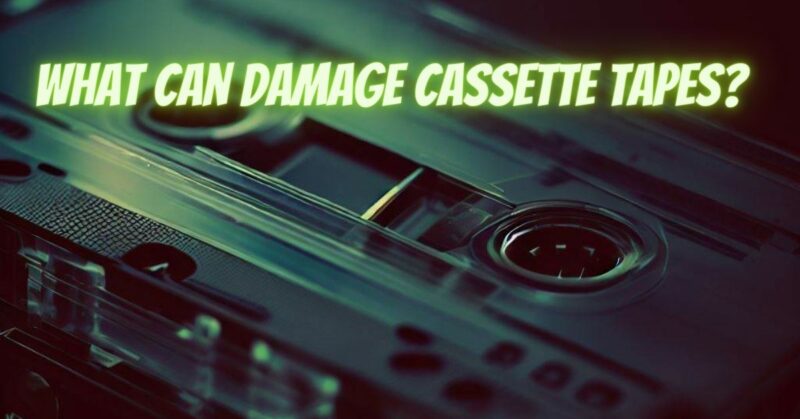Cassette tapes, once the embodiment of audio recording and playback, remain a cherished medium for music enthusiasts and collectors. To keep your cassette tapes in optimal condition and ensure the longevity of your audio treasures, it’s crucial to be aware of the potential hazards that can cause damage. In this article, we will explore the various factors and circumstances that can harm cassette tapes and how to safeguard them against deterioration.
Understanding Cassette Tape Composition
Before delving into the potential risks, let’s revisit the fundamental composition of a cassette tape:
- Magnetic Tape: At the core of a cassette tape lies a length of magnetic tape coated with iron oxide particles. This tape captures and stores audio signals as magnetic patterns.
- Plastic Shell: The tape is enclosed within a protective plastic shell, providing safety and ease of handling during playback and recording.
- Playback and Recording Components: Inside a cassette player or recorder, the tape interfaces with playback and recording heads, crucial for extracting audio and adding new content.
Common Threats to Cassette Tapes
Several factors and conditions can pose a threat to the integrity of cassette tapes:
- Excessive Heat: Exposure to high temperatures, such as direct sunlight or prolonged storage in a hot environment, can cause the plastic shell to warp and the tape to become brittle, potentially leading to permanent damage.
- Humidity and Moisture: High humidity levels can promote the growth of mold and fungus on cassette tapes, compromising their playability and audio quality.
- Dust and Debris: Dust and debris can accumulate on the tape’s surface or inside the cassette shell, hindering proper tape movement and affecting playback.
- Frequent Rewinding: Excessive or aggressive rewinding can lead to tape stretching and wear, diminishing playback quality over time.
- Tape Tension: Inconsistent tape tension during playback can result in poor audio quality and potential damage to the tape.
- Mishandling: Rough or careless handling of cassette tapes can cause warping, wrinkling, and damage to the tape and shell.
- Magnetic Fields: Exposure to strong magnetic fields, such as those generated by speakers or electronic devices, can erase or distort the magnetic patterns on the tape, resulting in data loss.
- Poor Storage Conditions: Storing cassette tapes in damp, humid, or excessively hot environments can accelerate tape degradation and damage the plastic shell.
- Neglect and Infrequent Playback: Long periods of neglect without playback can cause tapes to develop uneven tension, making them susceptible to damage during future use.
Preserving Your Cassette Tapes
To protect your cassette tapes and ensure their longevity, follow these preservation practices:
- Proper Storage: Store cassette tapes vertically in a cool, dry place away from direct sunlight and extreme temperatures. Consider using protective cases or sleeves to shield them from dust and debris.
- Regular Playback: Occasionally play your cassette tapes to keep them in good condition. Infrequent use can lead to tape stretching and tension issues.
- Gentle Handling: Handle tapes with clean hands, holding them by the edges to avoid touching the tape surface.
- Inspect Tapes: Periodically inspect your cassette tapes for signs of damage, such as wrinkles, warping, or residue. Address any issues promptly.
- Transfer to Digital: For valuable or irreplaceable recordings, consider transferring them to digital formats to ensure their long-term preservation.
Cassette tapes, while resilient, are not immune to the potential risks of damage over time. By understanding the factors that can harm them and taking proactive steps to protect and maintain your cassette collection, you can continue to enjoy the nostalgic charm and audio treasures they hold for years to come. Preserve the past and safeguard your audio memories against the perils that could otherwise compromise their integrity.


